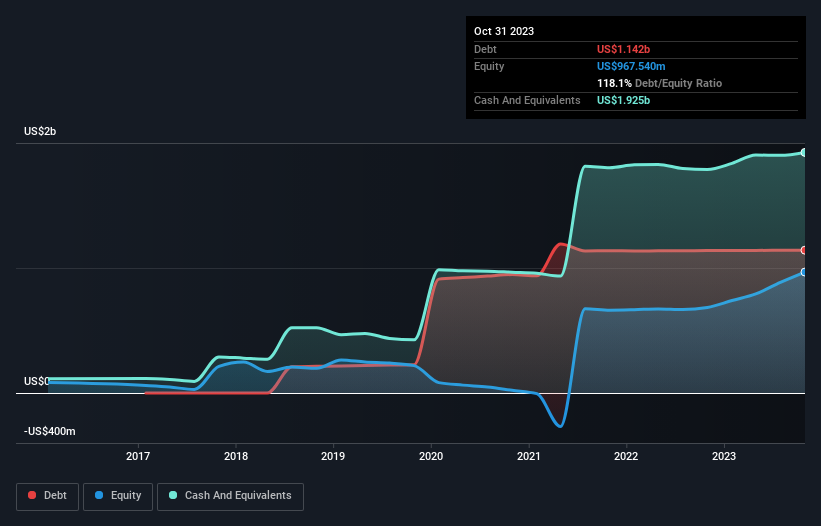
Legendary fund manager Li Lu (who Charlie Munger backed) once said, 'The biggest investment risk is not the volatility of prices, but whether you will suffer a permanent loss of capital.' So it seems the smart money knows that debt - which is usually involved in bankruptcies - is a very important factor, when you assess how risky a company is. We can see that MongoDB, Inc. (NASDAQ:MDB) does use debt in its business. But the real question is whether this debt is making the company risky.
When Is Debt A Problem?
Debt assists a business until the business has trouble paying it off, either with new capital or with free cash flow. In the worst case scenario, a company can go bankrupt if it cannot pay its creditors. However, a more common (but still painful) scenario is that it has to raise new equity capital at a low price, thus permanently diluting shareholders. Of course, debt can be an important tool in businesses, particularly capital heavy businesses. The first step when considering a company's debt levels is to consider its cash and debt together.
View our latest analysis for MongoDB
What Is MongoDB's Debt?
The chart below, which you can click on for greater detail, shows that MongoDB had US$1.14b in debt in October 2023; about the same as the year before. However, its balance sheet shows it holds US$1.92b in cash, so it actually has US$782.3m net cash.

How Healthy Is MongoDB's Balance Sheet?
Zooming in on the latest balance sheet data, we can see that MongoDB had liabilities of US$489.6m due within 12 months and liabilities of US$1.24b due beyond that. On the other hand, it had cash of US$1.92b and US$271.7m worth of receivables due within a year. So it can boast US$469.9m more liquid assets than total liabilities.
Having regard to MongoDB's size, it seems that its liquid assets are well balanced with its total liabilities. So while it's hard to imagine that the US$32.6b company is struggling for cash, we still think it's worth monitoring its balance sheet. Succinctly put, MongoDB boasts net cash, so it's fair to say it does not have a heavy debt load! The balance sheet is clearly the area to focus on when you are analysing debt. But it is future earnings, more than anything, that will determine MongoDB's ability to maintain a healthy balance sheet going forward. So if you want to see what the professionals think, you might find this free report on analyst profit forecasts to be interesting.
In the last year MongoDB wasn't profitable at an EBIT level, but managed to grow its revenue by 33%, to US$1.6b. Shareholders probably have their fingers crossed that it can grow its way to profits.
So How Risky Is MongoDB?
Although MongoDB had an earnings before interest and tax (EBIT) loss over the last twelve months, it generated positive free cash flow of US$89m. So although it is loss-making, it doesn't seem to have too much near-term balance sheet risk, keeping in mind the net cash. Keeping in mind its 33% revenue growth over the last year, we think there's a decent chance the company is on track. There's no doubt fast top line growth can cure all manner of ills, for a stock. The balance sheet is clearly the area to focus on when you are analysing debt. But ultimately, every company can contain risks that exist outside of the balance sheet. For example - MongoDB has 2 warning signs we think you should be aware of.
At the end of the day, it's often better to focus on companies that are free from net debt. You can access our special list of such companies (all with a track record of profit growth). It's free.
New: Manage All Your Stock Portfolios in One Place
We've created the ultimate portfolio companion for stock investors, and it's free.
• Connect an unlimited number of Portfolios and see your total in one currency
• Be alerted to new Warning Signs or Risks via email or mobile
• Track the Fair Value of your stocks
Have feedback on this article? Concerned about the content? Get in touch with us directly. Alternatively, email editorial-team (at) simplywallst.com.
This article by Simply Wall St is general in nature. We provide commentary based on historical data and analyst forecasts only using an unbiased methodology and our articles are not intended to be financial advice. It does not constitute a recommendation to buy or sell any stock, and does not take account of your objectives, or your financial situation. We aim to bring you long-term focused analysis driven by fundamental data. Note that our analysis may not factor in the latest price-sensitive company announcements or qualitative material. Simply Wall St has no position in any stocks mentioned.
About NasdaqGM:MDB
Flawless balance sheet very low.
Similar Companies
Market Insights
Community Narratives



